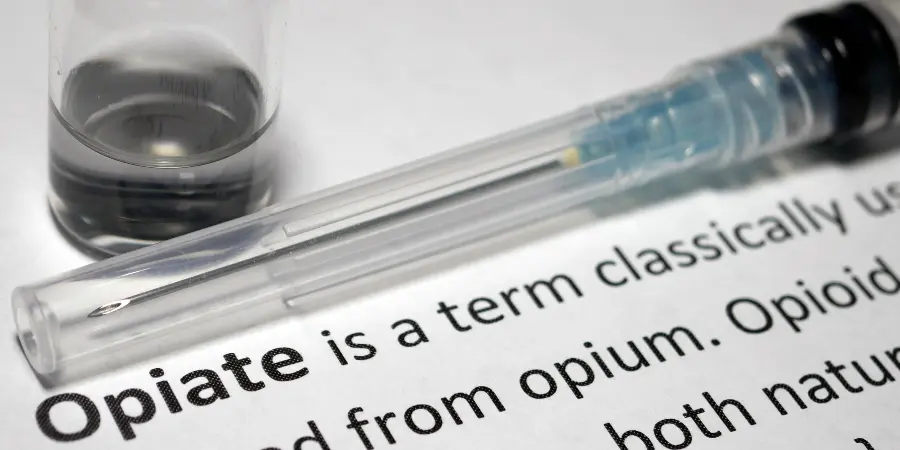
Written by:

Medically Reviewed by:
Last Updated:
August 13th, 2025
Opioid Addiction | Types, Symptoms and Effects
Opiates are a class of pain-relieving drugs which contain compounds found naturally in the opium poppy plant. This substance can be found in many over-the-counter medications and is prescribed to treat moderate to severe pain. However, the benefits of inducing pleasure and significantly reducing discomfort make opiates extremely addictive.
Opiate addiction is an ever-growing problem, with many users falling victim to its dangerous consequences. In fact, almost half of all drug poisoning deaths in 2020 involved an opiate. With such a high level of risk, it is essential that if you are concerned about your opiate use, you seek immediate support.

Why are opiates addictive?
In addition to their properties as an anaesthetic, some of the sensations induced by opiates can lead users to become dependent on the drug, taking the substance far longer than approved by the prescribing doctor.
Opiates can be so addictive because of the way they work in the brain. By triggering a release of endorphins, these chemicals help to relieve pain naturally, repressing pain perception in the body and boosting more pleasurable sensations. Some users have described their experiences with opiates as euphoric, with the drug improving their overall mood and relaxing them.
However, as these drugs act strongly on the brain’s pleasure centres, before long, those who abuse the drug will feel driven to take more of it in shorter intervals to achieve that same initial feeling. This is how opiate addiction develops.
Am I addicted to opiates?
Sometimes it can be difficult to admit that your opiate use has developed into an addiction, as the condition will present itself differently from person to person. However, if you feel that any of these below statements apply to you, this may indicate you are suffering from addiction to opiates.
Some classic signs of opiate addiction can include:
- Regularly taking the drug in a way not approved by the doctor
- Seeking the same medication from multiple physicians
- Heightened tolerance to the drug
- Changes in sleeping habits
- Stealing from loved ones to fund your drug use
- Loss of interest in activities once enjoyed
If you have been abusing opiates, some of the short-term symptoms associated with the substance include:
- Constipation
- Nausea
- Dizziness
- Confusion or disorientation
- Significant changes to mood

Myths about opiate addiction
Risks associated with opiate addiction
There are a number of risks associated with chronic opiate use; therefore, it is vital that you seek treatment as soon as possible to protect your welfare. Some of these risks include:
Physical side-effects
Studies show that chronic opiate abuse can lead to significant declines in health-related quality of life, and it is possible for a number of physical side effects to manifest following continued use. Some of these include:
- Serious fractures
- Bowel obstruction
- Breathing problems
Strained relationships
When people become addicted to a habit-forming substance, this can make it particularly difficult for them to see things as clearly as they once did. Things in life that were important, such as relationships, can fall by the wayside in favour of opiates. Oftentimes, this can prove too difficult for loved ones to witness, and watching this illness unfold from such an intimate setting cause irreversible damage to a relationship. This is why it is essential to seek the help that you need as soon as possible to begin rebuilding your life as it was before opiate addiction took hold.

Overdose
At high doses, opiate consumption can decrease both breathing and heart rate to dangerously low levels, which, in some circumstances, can result in death. An overdose will usually occur by taking too much of the substance, and those struggling with opiate addiction are likely to abuse more and more of the substance to achieve the same effect. Therefore, if you are taking opiates in a way not recommended by your doctor, it is essential that you seek support to come off opiates.
Can I overcome opiate addiction?
Opiate addiction can feel like a tremendously difficult illness to overcome, especially without the proper help and support to begin coming off the substance. Fortunately, however, there are a number of different programmes out there that can help you overcome your reliance once and for all.
It is widely understood that opiate rehab is the most effective option for addiction to opiates. Here at Primrose Lodge, our holistic combination of medically assisted opiate detox, and variety of therapeutic activities will enable you to address both the psychological and physical aspects of your addiction in a safe, nurturing space.
Types of opiate addiction we treat
At Primrose Lodge, we provide addiction treatment for a number of opiates, including:
![]()
Buprenorphine addiction
Click the button below to learn more about buprenorphine addiction.
![]()
Codeine addiction
Click the button below to learn more about codeine addiction, and its signs, symptoms and effects.
![]()
Dihydrocodeine addiction
Click the button below to learn more about dihydrocodeine addiction.
![]()
Fentanyl addiction
Click the button below to learn more about fentanyl addiction, and its signs, symptoms and effects.
![]()
Methadone addiction
Click the button below to learn more about methadone addiction, and its signs, symptoms and effects.
![]()
Morphine addiction
Click the button below to learn more about morphine addiction, and its signs, symptoms and effects.
![]()
Oxycodone addiction
Click the button below to learn more about oxycodone addiction, and its signs, symptoms and effects.
![]()
Tramadol addiction
Click the button below to learn more about tramadol addiction, and its signs, symptoms and effects.
![]()
Vicodin addiction
Click the button below to learn more about Vicodin addiction, and its signs, symptoms and effects.
Reach out today
If you are struggling with opiate addiction, we at Primrose Lodge would like to assure you that there is help available, and you are not alone. With a fantastic team of dedicated staff, you will be in the best of care as you start on your journey to recovery. If you are ready to take this vital first step, our expertise can be at your disposal in only a few moments. Opiate addiction can be a terrible affliction, placing a huge strain on you and your loved ones. However, by engaging with our intensive support, you can begin to seek freedom, free from the binds of addiction.
If you would like any more information about opiate addiction, do not hesitate to contact us right away.



